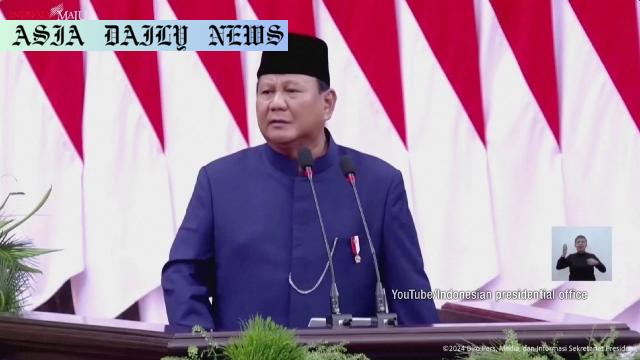Prabowo Russia Visit: Indonesian President Prabowo Subianto will attend an economic forum in St. Petersburg and meet President Putin.
- Prabowo Subianto will skip the G7 outreach session in Canada scheduled for June 17.
- He will visit Russia from June 18-20 to attend an economic forum in St. Petersburg.
- Prabowo is also set to hold discussions with Russian President Vladimir Putin.
- Indonesia’s foreign ministry cited scheduling conflicts as the reason for skipping the G7 summit.

A Strategic Decision: Prabowo’s Russia Visit Takes Priority
Indonesian President Prabowo Subianto has opted to forgo attending the Group of Seven (G7) outreach meeting in Canada scheduled for June 17, citing a prior commitment to visit Russia. The visit to Russia, from June 18 to 20, will include attendance at a significant economic forum in St. Petersburg and a high-profile meeting with Russian President Vladimir Putin. This decision, while sparking some global intrigue, underscores Indonesia’s strategic balancing of international relations.
The G7 vs Russia: A Scheduling Conflict or a Tactical Move?
Indonesia’s foreign ministry has clarified that the decision to prioritize the Russia visit over the G7 gathering was due to a scheduling conflict — the invitation to the G7 arrived after the Russia trip had already been confirmed. However, some media chatter hints at a deeper geopolitical calculus. Reports circulating on social media suggested that Prabowo declined the G7 meeting to accept Putin’s invitation, an allegation vehemently denied by Indonesian officials.
Key Agendas in Russia
During his time in Russia, Prabowo will engage in discussions on economic cooperation, trade, and investment prospects at the St. Petersburg International Economic Forum. His meeting with President Putin is likely to include discussions on regional stability, energy partnerships, and potential arms deals. This visit comes amidst a tense global landscape shaped by Western sanctions on Russia and a growing East-West divide.
Stronger Bilateral Cooperation with the United States
Interestingly, Prabowo’s diplomatic engagements have not been limited to Russia. Just days before his Russia trip, he engaged in a phone call with U.S. President Donald Trump, during which the two leaders discussed ways to enhance bilateral relations. This highlights Indonesia’s attempt to maintain a strategic balance in its foreign policy by cultivating robust ties with both Western and non-Western powers.
Indonesia’s Geopolitical Position
As Southeast Asia’s largest economy and a pivotal player in the region, Indonesia’s foreign policy carries significant weight. The decision to attend a Russian forum over the G7 session could reflect Jakarta’s intent to diversify its alliances and assert its neutrality amid a polarized global order. This move also raises important questions about the country’s role and priorities in shaping international diplomacy at a time of shifting alliances.
The Ramifications of Prabowo’s Choices
Choosing to engage with Russia at a time of strained East-West relations could yield both opportunities and risks for Indonesia. On the one hand, it allows the country to leverage economic partnerships with Russia and enhance its commercial ties. On the other hand, it might be perceived as a gesture of alignment, which could complicate Indonesia’s relationships with Western powers. Ultimately, this move underscores the importance of Indonesia’s multifaceted foreign policy strategy.
A Balancing Act in a Divided World
Prabowo Subianto’s decision to engage both Russia and the United States in close succession highlights Indonesia’s adeptness at balancing its diplomatic relationships. His actions reflect the careful navigation required for Indonesia to secure its economic and geopolitical interests while maintaining its non-aligned status.



Commentary
Prabowo’s Decision Highlights Indonesia’s Foreign Policy Challenges
The decision of Indonesian President Prabowo Subianto to skip the G7 outreach session in favor of a visit to Russia has drawn attention to the complexities of modern geopolitics. While the foreign ministry has attributed the decision to a scheduling conflict, the timing and nature of these developments suggest a deeper narrative at play. It is evident that Indonesia is striving to assert itself as a non-aligned key player in an increasingly polarized global environment.
Indonesia’s Strategic Balancing Act
What stands out most about this decision is Prabowo’s ability to engage with both ends of the geopolitical spectrum in a relatively neutral manner. By attending an economic forum in Russia and holding talks with President Putin, Indonesia signals its willingness to foster economic and political partnerships beyond its traditional Western allies. Meanwhile, the recent phone call between Prabowo and U.S. President Donald Trump underscores Jakarta’s intention to maintain and expand its ties with the West.
Potential Implications of Skipping the G7
Skipping the G7 summit could be interpreted as a missed opportunity to strengthen Indonesia’s engagement with the world’s most industrialized nations. However, prioritizing a visit to Russia could position the country as a more assertive and independent player on the global stage. It’s a bold move that comes with potential benefits — enhanced economic ties with Russia — as well as risks, such as misunderstandings or tensions with certain Western capitals.
Indonesia’s Role in a Fragmented World
The broader takeaway here is Indonesia’s role in navigating a world increasingly divided by competing interests and ideologies. Prabowo’s actions reflect not just a leader’s resolve but also a nation’s need to adapt to evolving global dynamics. As Indonesia continues to grow its economy and assert itself on the regional stage, decisions like these are likely to have wide-ranging implications, not just for its international relations but also for its domestic political landscape.